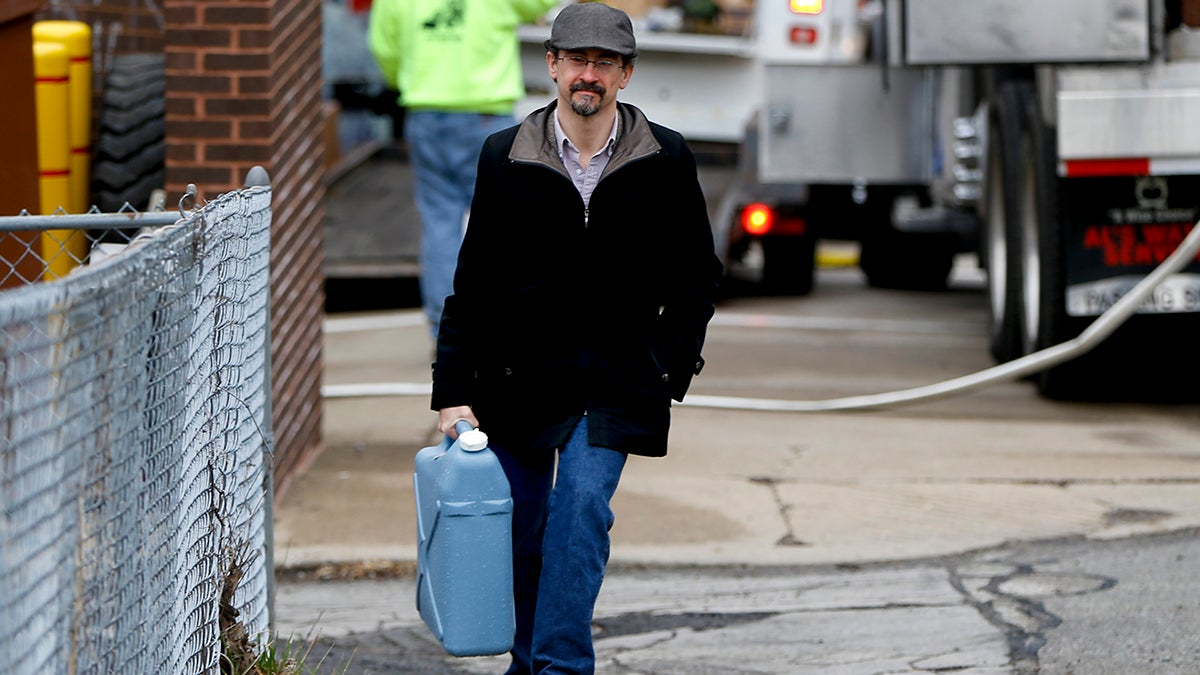Pittsburgh to provide water filters to all residents to reduce lead exposure

Tim Stuhldeher carries a container of water after filling it at a fire station in Pittsburgh’s Lawrenceville neighborhood on Feb. 1, 2017. After the state’s Department of Environmental Protection found low levels of chlorine at a city water facility, the subsequent flush-and-boil advisory affected 100,000 customers. Pittsburgh Mayor Bill Peduto announced on Wednesday that as Pittsburgh updates its aging water infrastructure, all city residents will receive a water filter. (AP Photo/Keith Srakocic)
The Safe Water Plan began with a natural gas utility’s decision to give the city $500,000.
With no exceptions, the $1 million Safe Water Plan will distribute water filters to city residents to reduce exposure to lead. People living within the city’s boundaries are eligible to receive one, regardless of income level, whether they rent or own, or who their water provider is.
While it’s a start, Mayor Bill Peduto said this is not a long-term solution.
“This is a Band-Aid. Decades of inadequate maintenance of our infrastructure has led to a situation where our pipes are breaking, the system itself is in disrepair, and hundreds of millions of dollars will be needed in order to solve it over the course of the next decade or more,” said Peduto.
In addition to point-of-use filters, the city will also install point-of-entry filters in public buildings, meaning all water coming into schools, senior centers, and recreation centers will be cleaned as it enters. Details of distribution and installation are still being worked out.
The plan was announced after Peoples natural gas company’s president and CEO Morgan O’Brien committed $500,000 to the effort, matched by funds from the city and the Pittsburgh Water and Sewer Authority.
In recent weeks, city councilwoman Deborah Gross had called on the city to provide water filters to families with young children. Gross is a PWSA board member. O’Brien saw Gross’s press conference, and called the mayor’s office to offer help.
Peduto said the plan buys the city some time. Updating Pittsburgh’s water infrastructure will cost millions of dollars and could take more than a decade. In particular, locating and replacing lead service lines will take time.
“What we can do is start to be able to identify where they are, start to become more proactive in determining water tests, to be able to test different areas of the city that maybe people haven’t been calling in from. And to be able to put a priority list together to address it,” said Peduto.
Currently, PWSA can not replace lead service lines that lead from the main line to the house; that is the homeowner’s responsibility. Peduto said the city will work with state legislators to change that. In the interim, the city’s Urban Redevelopment Authority will vote Thursday on a loan program that would help low-income homeowners replace their lead lines.
There are more than 3,000 water systems in Pennsylvania. More than 100 have exceeded federal limits for lead at least once.
WHYY is your source for fact-based, in-depth journalism and information. As a nonprofit organization, we rely on financial support from readers like you. Please give today.


